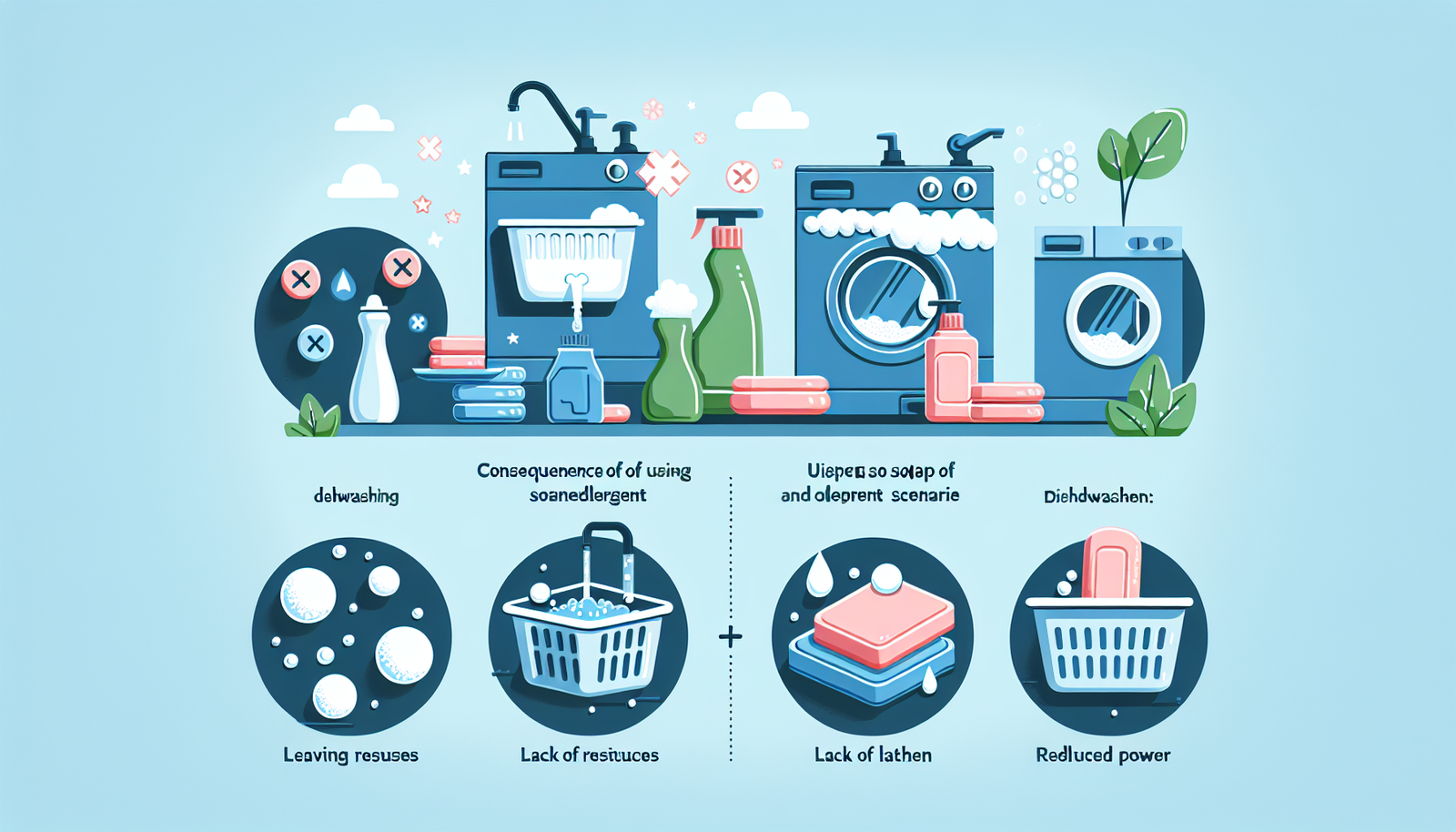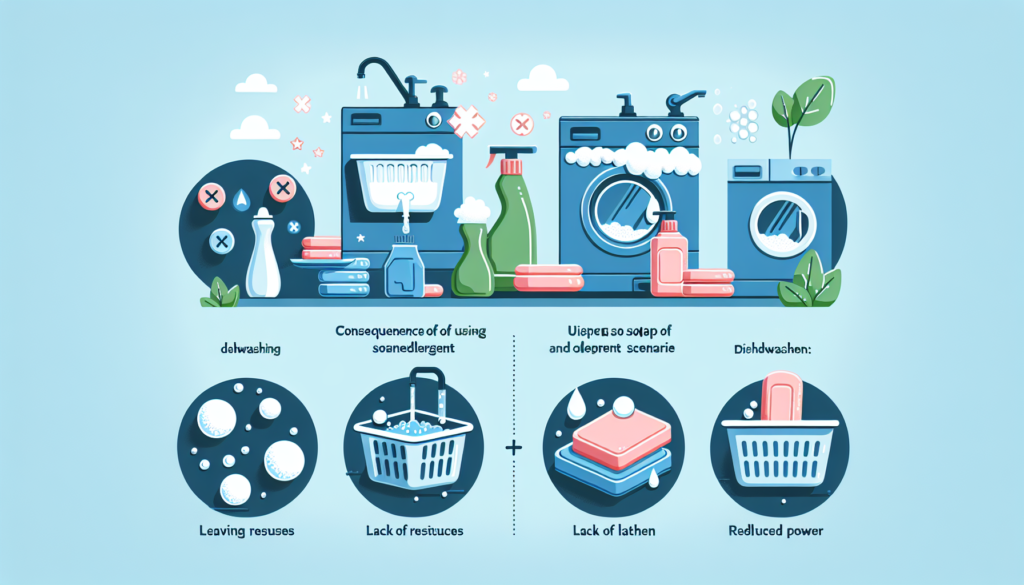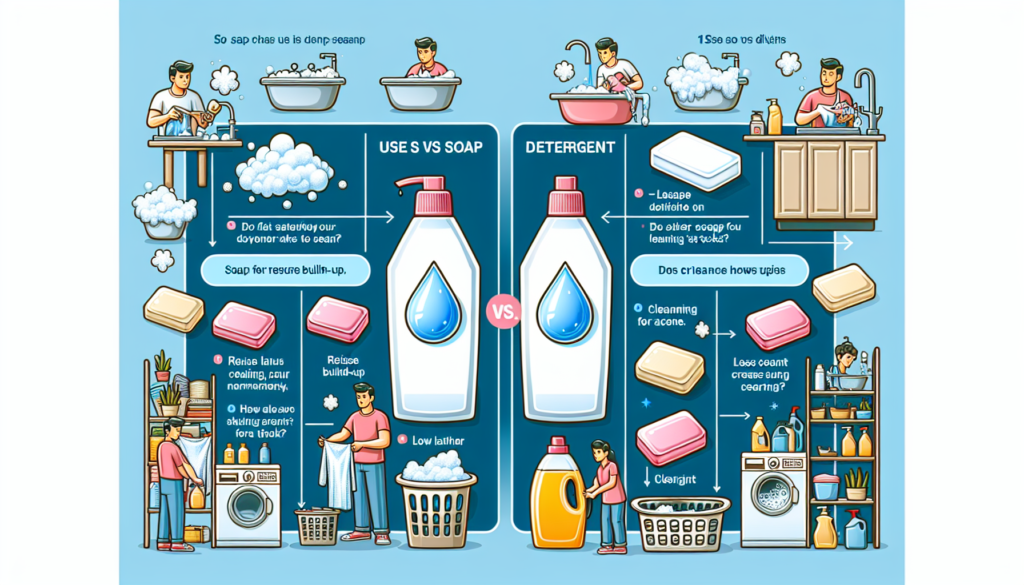
Have you ever wonder what happens if you used soap instead of laundry detergent? Well, using soap as a substitute for detergent might seem like a convenient option, especially if you run out of detergent unexpectedly. However, the truth is that soap and detergent are not the same thing, and using soap in your washing machine can have some unexpected consequences. In this article, we will explore the effects of using soap instead of detergent, and why it’s best to stick to using the appropriate cleaning agents for your laundry.
Effects on Cleaning Efficiency
Different Chemical Properties
“What Happens If You Use Soap Instead Of Detergent?” is a question that highlights the impact of different chemical properties on cleaning efficiency. Using soap instead of detergent can affect how well your laundry is cleaned due to these differences. Soap, made from natural ingredients like fats or oils, is more gentle compared to detergents formulated with synthetic surfactants. While soap can be effective at removing dirt and grime, it might struggle with tougher stains and grease due to its natural composition.
Less Effective on Stains
Addressing the query “What Happens If You Use Soap Instead Of Detergent?” further, it’s clear that when it comes to stain removal, soap may not be as effective as detergents. Stains often require the use of enzymes or specific chemicals typically found in detergents, which help break down and loosen stubborn stains for easy removal. Soap, lacking these powerful components, may not have the same stain-fighting capabilities, potentially leaving stains behind even after washing.
Residue and Build-Up
Soap has a tendency to leave behind residue and build-up on fabrics and surfaces. This residue can contribute to a dull and dingy appearance on clothes and can even make fabrics feel stiff or sticky. Additionally, soap residue can attract dirt and grime, resulting in the need for more frequent washing. Detergents, on the other hand, are formulated to rinse away cleanly, reducing the likelihood of residue and build-up.
Impact on Fabric
Harsh on Fabrics
Moreover, in the context of “What Happens If You Use Soap Instead Of Detergent,” soap, particularly bar soap, can be harsh on fabrics due to its alkaline nature. The alkalinity of soap can weaken fibers over time, causing them to become more prone to damage and wear. This can lead to fabrics losing their strength and durability, ultimately shortening their lifespan. Conversely, detergents are formulated to be more gentle on fabrics, thus reducing the risk of damage.
Color Fading
Soap can also contribute to color fading in fabrics. Certain soaps contain brighteners or bleaching agents that can strip away color from clothes, resulting in a dull or faded appearance. This is especially true for brightly colored or vibrant fabrics. Detergents, on the other hand, are typically formulated to preserve the color of fabrics and prevent fading.
Damage to Delicate Fabrics
Delicate fabrics, such as silk or lace, can be easily damaged by the alkaline nature of soap. Soap can cause fibers to become weak or even dissolve, leading to holes or tears in delicate fabrics. Detergents are generally milder and more suitable for delicate fabrics, ensuring that they are cleaned effectively while minimizing the risk of damage.

Foaming and Sudsing
Excessive Foam
Additionally, one of the drawbacks of using soap instead of detergent, as outlined in “What Happens If You Use Soap Instead Of Detergent,” is the potential for excessive foaming. Soap has a natural tendency to produce more foam, which can lead to issues in the washing machine. Excessive foam can prevent proper water circulation, resulting in poor cleaning performance and inefficient rinsing. This can leave behind soap residue on clothes and impact the overall cleaning efficiency.
Issues in High-Efficiency Washers
High-efficiency washers are designed to use less water and energy, and they require low-sudsing detergents to function optimally. Using soap in a high-efficiency washer can lead to excessive foaming, which can cause the washer to malfunction and potentially result in damage to the machine. It is important to use detergents specifically formulated for high-efficiency washers to avoid these issues.
Clogging and Overloading
Excessive foam caused by soap can also clog drains and pipes, especially in older plumbing systems. The foam can build up and create blockages, leading to slow drainage or even backups. Additionally, using too much soap can overload the washing machine, resulting in poor cleaning performance and potential damage to the machine.
Effect on Water Quality
Hard Water Reaction
Soap has a tendency to react with hard water minerals, such as calcium and magnesium, resulting in the formation of soap scum. Soap scum can adhere to fabrics and surfaces, making them look dull and feeling stiff. It can also contribute to clogged pipes and reduced water flow. Detergents are formulated to work well in both hard and soft water, minimizing the negative effects of hard water minerals.
Limescale Build-Up
Using soap in hard water can also lead to limescale build-up in washing machines or on surfaces. Limescale is a hard, chalky residue that forms when calcium and magnesium precipitate out of hard water. It can impact the performance and lifespan of appliances, as well as make surfaces look unsightly. Detergents that contain water softeners can help prevent limescale build-up and maintain the efficiency of appliances.
 Environmental Consequences
Environmental Consequences
Impact on Water Ecosystems
Soap, especially certain types that contain phosphates, can have detrimental effects on water ecosystems. When phosphates are released into water bodies, they can cause excessive algae growth, resulting in oxygen depletion and harm to aquatic life. Detergents have undergone reformulations to reduce or eliminate phosphates, making them a more environmentally-friendly choice.
Biodegradability
Soap is generally more biodegradable compared to detergents. This means that soap can break down more easily in the environment, reducing its impact on ecosystems. However, it is important to note that not all soaps are equally biodegradable, and some may still contain ingredients that are harmful to the environment. Environmentally-friendly detergents are formulated to be biodegradable and minimize their impact on the environment.
Wastewater Treatment
The presence of soap in wastewater can pose challenges to the treatment process. Soap can interfere with bacterial breakdown and may require additional treatment to remove or neutralize. Detergents that are specifically designed for wastewater treatment can help ensure that the treatment process is more effective and efficient.
Health Concerns
Skin Irritation
Certain soaps, especially those that contain harsh chemicals or fragrances, can cause skin irritation and allergic reactions. These reactions can manifest as redness, itching, or dryness of the skin. Detergents that are formulated to be hypoallergenic or suitable for sensitive skin can help minimize the risk of skin irritations.
Respiratory Problems
Some people may experience respiratory issues when exposed to soap fumes or aerosols. This can be particularly problematic for individuals with pre-existing respiratory conditions, such as asthma or allergies. Using detergents with low volatile organic compound (VOC) content can help reduce the risk of respiratory problems.
Allergies
Soap ingredients, such as fragrances or dyes, can trigger allergic reactions in certain individuals. These reactions can range from mild skin irritations to more severe allergic responses. Detergents that are free from common allergens and are labeled as hypoallergenic can be a safer alternative for individuals with allergies or sensitivities.

Effectiveness in Different Types of Washing
Laundry
When it comes to laundry, detergents are generally the preferred choice due to their effectiveness in stain removal and overall cleaning performance. Detergents are formulated to work well with a wide range of fabrics and stain types, making them suitable for everyday laundry needs. Soap, on the other hand, may be more suitable for handwashing delicate fabrics or for use in specific situations where stains are less of a concern.
Dishwashing
For dishwashing, detergents specifically formulated for this purpose are recommended. Dishwashing detergents are designed to cut through grease and food residues, leaving dishes clean and grease-free. Soap may not be as effective at removing tough food residues and may leave behind a greasy film on dishes.
Handwashing
Soap is well-suited for handwashing, especially when it comes to personal hygiene. Soap can effectively break down oils, dirt, and germs on the skin, leaving hands clean and fresh. Detergents are not designed for use on the skin and may be too harsh, leading to dryness or irritation.
Recommended Uses of Soap
Cleaning Surfaces
Soap can be used effectively for cleaning various surfaces in the home, such as countertops, floors, and bathroom fixtures. Its natural cleaning properties make it suitable for removing dirt and grime from different surfaces. However, it is important to check manufacturer recommendations and instructions to ensure that soap is safe to use on specific surfaces.
Personal Hygiene
Soap is an essential component of personal hygiene and is used for handwashing, bathing, and showering. It helps remove dirt, oils, and germs from the skin, keeping it clean and preventing the spread of infections. Different types of soap are available to cater to different skin types and preferences.
Handwashing Clothes
When it comes to handwashing clothes, soap can be a practical choice. It can effectively clean clothes when gentle agitation is applied, and it is suitable for fabrics that may require a milder cleaning approach. However, for heavily soiled or stained clothes, a detergent may be more effective in achieving optimal cleaning results.

Comparative Costs
Soap vs Detergent
In terms of cost, soap is generally more affordable compared to detergent. Soap is widely available and comes in various forms, from liquid to bar soap, providing options for different budgets. Detergents, especially those with specialized formulations for specific purposes, may come at a higher price point.
Long-Term Savings
While soap may be more affordable upfront, it is important to consider the long-term savings that can be achieved by using detergents. Detergents are often formulated to be concentrated, meaning that a smaller amount can be used per load compared to soap. This can help reduce overall consumption and result in cost savings in the long run.
Conclusion
Using soap instead of detergent, a situation often described in “What Happens If You Use Soap Instead Of Detergent,” can have both positive and negative effects on cleaning efficiency, fabric care, water quality, the environment, and personal health. While soap may be more gentle on fabrics and have fewer environmental consequences, detergents are generally more effective in stain removal, provide better cleaning performance, and are suitable for a wide range of washing needs. Therefore, it is crucial to consider individual preferences, needs, and circumstances when deciding between soap and detergent for various cleaning tasks. Visit Detergent Fox to learn more about detergents!
